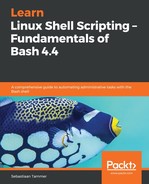In our scripting endeavors, we always include a header at the beginning of the script. While this is not necessary for the functioning of the script, it can help greatly when other people are working with your scripts (or, again, when you're working with other people's scripts). A header can include any information you think is needed, but in general we always start with the following fields:
- Author
- Version
- Date
- Description
- Usage
By implementing a simple header using comments, we can give someone who stumbles upon the script an idea of when it was written and by whom (should they have questions). Furthermore, a simple description gives a goal to the script, and usage information ensures there is no trial and error when using a script for the first time. Let's create a copy of our hello-world.sh script, call it hello-world-improved.sh, and implement both a header and a comment for the functionality:
reader@ubuntu:~/scripts/chapter_07$ ls -l
total 4
-rwxrwxr-x 1 reader reader 33 Aug 26 12:08 hello-world.sh
reader@ubuntu:~/scripts/chapter_07$ cp hello-world.sh hello-world-improved.sh
reader@ubuntu:~/scripts/chapter_07$ vi hello-world-improved.sh
Make sure the script looks like the following, but be sure to enter the current date and your own name:
#!/bin/bash
#####################################
# Author: Sebastiaan Tammer
# Version: v1.0.0
# Date: 2018-08-26
# Description: Our first script!
# Usage: ./hello-world-improved.sh
#####################################
# Print the text to the Terminal.
echo "Hello World!"
Now, doesn't that look nice? The only thing that might stick out is that we now have a script of 12 lines, where only a single line contains any functionality. In this case, indeed, it seems a bit much. However, we're trying to learn good practices. As soon as scripts become more complicated, these 10 lines we're using for the shebang and the header will not make a difference, but the usability increases notably. While we're at it, we're introducing a new head command.
reader@ubuntu:~/scripts/chapter_07$ head hello-world-improved.sh
#!/bin/bash
#####################################
# Author: Sebastiaan Tammer
# Version: v1.0.0
# Date: 2018-08-26
# Description: Our first script!
# Usage: ./hello-world-improved.sh
#####################################
reader@ubuntu:~/scripts/chapter_07$
The head command is like cat, but it does not print the whole file; by default, it only prints the first 10 lines. Which, not entirely coincidentally, is exactly as long as we created our header to be. So, anybody that wants to use your script (and, let's be honest, you after 6 months are also anybody) can just use head to print the header and get all the information needed to start using the script.
While we're introducing head, we would be negligent if we did not introduce tail as well. As the name might imply, while head prints the top of the file, tail prints the end of the file. While this does not help us with our script headers, it is very useful when looking at log files for errors or warnings:
reader@ubuntu:~/scripts/chapter_07$ tail /var/log/auth.log
Aug 26 14:45:28 ubuntu systemd-logind[804]: Watching system buttons on /dev/input/event1 (Sleep Button)
Aug 26 14:45:28 ubuntu systemd-logind[804]: Watching system buttons on /dev/input/event2 (AT Translated Set 2 keyboard)
Aug 26 14:45:28 ubuntu sshd[860]: Server listening on 0.0.0.0 port 22.
Aug 26 14:45:28 ubuntu sshd[860]: Server listening on :: port 22.
Aug 26 15:00:02 ubuntu sshd[1079]: Accepted password for reader from 10.0.2.2 port 51752 ssh2
Aug 26 15:00:02 ubuntu sshd[1079]: pam_unix(sshd:session): session opened for user reader by (uid=0)
Aug 26 15:00:02 ubuntu systemd: pam_unix(systemd-user:session): session opened for user reader by (uid=0)
Aug 26 15:00:02 ubuntu systemd-logind[804]: New session 1 of user reader.
Aug 26 15:17:01 ubuntu CRON[1272]: pam_unix(cron:session): session opened for user root by (uid=0)
Aug 26 15:17:01 ubuntu CRON[1272]: pam_unix(cron:session): session closed for user root
reader@ubuntu:~/scripts/chapter_07$
